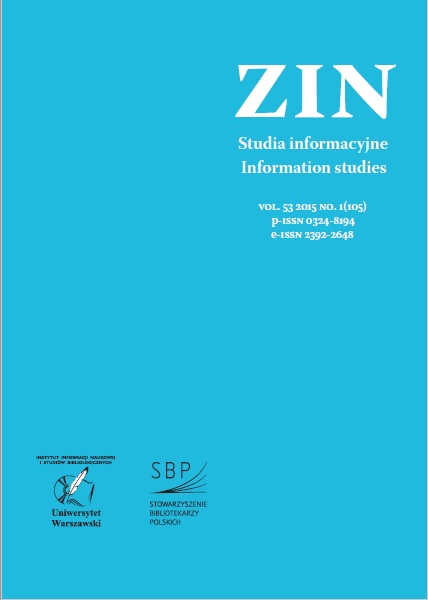Using, Citing and Publishing Scholarly Content in the Digital Age: Case Study of Humanities Researchers
Using, Citing and Publishing Scholarly Content in the Digital Age: Case Study of Humanities Researchers
Author(s): David NicholasSubject(s): Library and Information Science
Published by: Wydawnictwa Uniwersytetu Warszawskiego
Keywords: Humanities; Disciplinary differences; Information seeking; Trustworthiness; Scholarly communication
Summary/Abstract: PURPOSE: The research upon which this article is largely based comes from a year-long international study of trustworthiness in scholarly Communications in the digital age, Essentially, the main thrust of the project was to determine the impact of the digital transition and the new products it has ushered in, such as open access publications and the social media, on academic researchers’ scholarly practices. This paper focuses and reflects further on the disciplinary differences of scholarly researchers when it comes to using, citing and publishing and, especially, whether arts and humanities researchers are any different in the way they think and behave to their counterparts in the sciences and social sciences. APPROACH/METHODS: An international survey of over 3650 academic researchers examined how trustworthiness is determined when making decisions on scholarly reading, citing, and publishing in the digital age. The survey asked respondents whether or not they agreed with comments and ąuotes about scholarly behaviour obtained from pre-survey focus groups and interviews. Data from focus groups, interviews and the published literature are also used to explain further the results of the survey. RESULTS AND CONCLUSIONS: In generał, it was found that traditional methods and criteria remain important across the board. That is, researchers have moved inexorably from a print-based system to a digital system, but have not significantly changed the way they decide what to trust, where to publish, what to cite or use. Social media outlets and (non-peer reviewed) open access publications are not fully trusted. However, there were some significant differences according to the discipline of the respondent and this papers focuses upon these differences by comparing the views and behaviour of arts and humanities researchers with those from other disciplines. The main findings were: a) journals and the metrics that surround them are clearly not so important to humanities scholars, but nevertheless still pretty important; b) humanities researchers take a lot more care about what they use and where content comes from; c) humanities researchers look slightly more favourably on the social media. Originality/value: As far as it is known this is the first comprehensive study of digital humanities researchers and their decisions on what they use and cite and where they choose to publish.
Journal: Zagadnienia Informacji Naukowej – Studia Informacyjne
- Issue Year: 53/2015
- Issue No: 1 (105)
- Page Range: 7-19
- Page Count: 13
- Language: English

